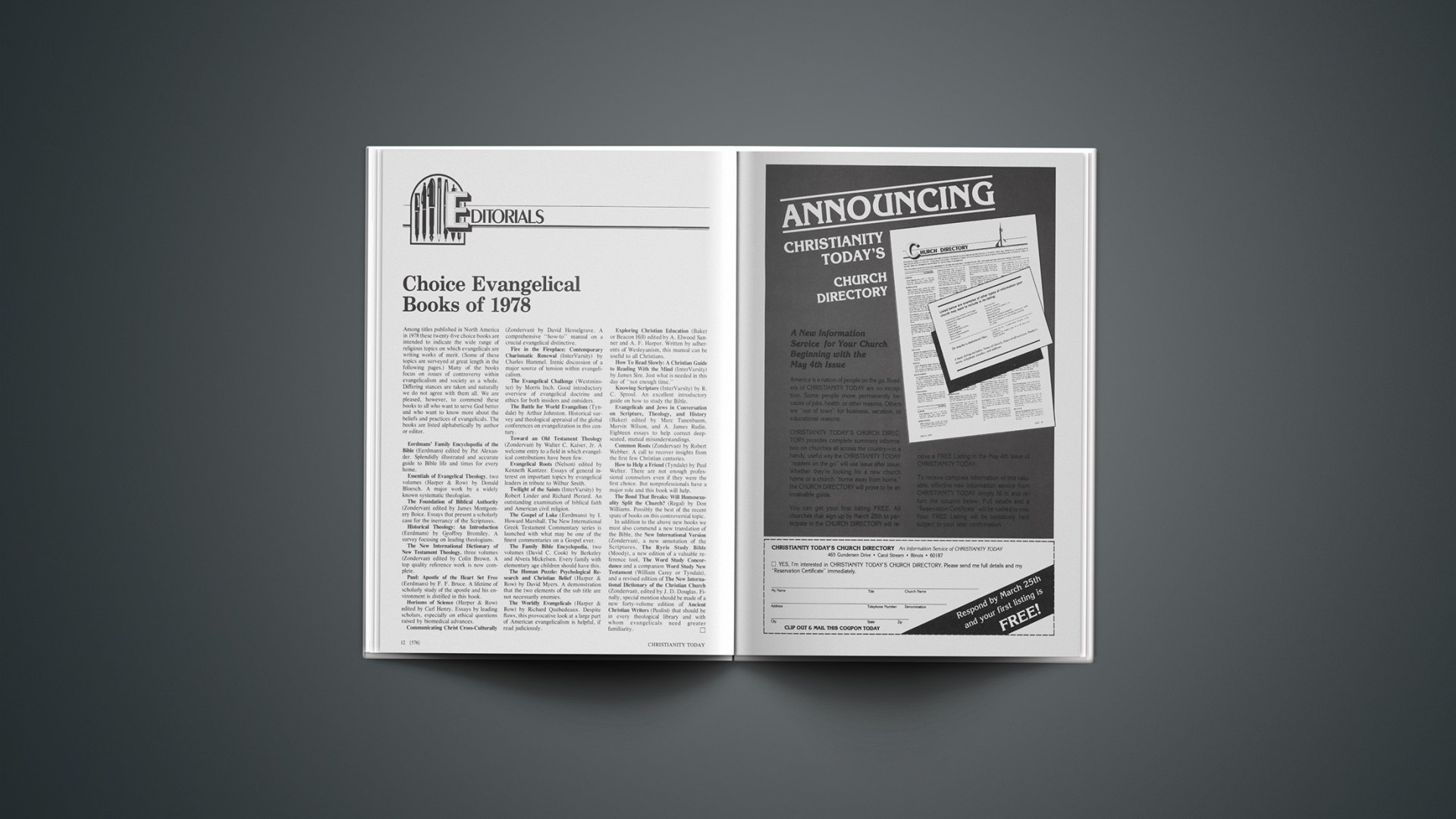Among titles published in North America in 1978 these twenty-five choice books are intended to indicate the wide range of religious topics on which evangelicals are writing works of merit. (Some of these topics are surveyed at great length in the following pages.) Many of the books focus on issues of controversy within evangelicalism and society as a whole. Differing stances are taken and naturally we do not agree with them all. We are pleased, however, to commend these books to all who want to serve God better and who want to know more about the beliefs and practices of evangelicals. The books are listed alphabetically by author or editor.
Eerdmans’ Family Encyclopedia of the Bible (Eerdmans) edited by Pat Alexander. Splendidly illustrated and accurate guide to Bible life and times for every home.
Essentials of Evangelical Theology, two volumes (Harper & Row) by Donald Bloesch. A major work by a widely known systematic theologian.
The Foundation of Biblical Authority (Zondervan) edited by James Montgomery Boice. Essays that present a scholarly case for the inerrancy of the Scriptures.
Historical Theology: An Introduction (Eerdmans) by Geoffrey Bromiley. A survey focusing on leading theologians.
The New International Dictionary of New Testament Theology, three volumes (Zondervan) edited by Colin Brown. A top quality reference work is now complete.
Paul: Apostle of the Heart Set Free (Eerdmans) by F. F. Bruce. A lifetime of scholarly study of the apostle and his environment is distilled in this book.
Horizons of Science (Harper & Row) edited by Carl Henry. Essays by leading scholars, especially on ethical questions raised by biomedical advances.
Communicating Christ Cross-Culturally (Zondervan) by David Hesselgrave. A comprehensive “how-to” manual on a crucial evangelical distinctive.
Fire in the Fireplace: Contemporary Charismatic Renewal (InterVarsity) by Charles Hummel. Irenic discussion of a major source of tension within evangelicalism.
The Evangelical Challenge (Westminster) by Morris Inch. Good introductory overview of evangelical doctrine and ethics for both insiders and outsiders.
The Battle for World Evangelism (Tyndale) by Arthur Johnston. Historical survey and theological appraisal of the global conferences on evangelization in this century.
Toward an Old Testament Theology (Zondervan) by Walter C. Kaiser, Jr. A welcome entry to a field in which evangelical contributions have been few.
Evangelical Roots (Nelson) edited by Kenneth Kantzer. Essays of general interest on important topics by evangelical leaders in tribute to Wilbur Smith.
Twilight of the Saints (InterVarsity) by Robert Linder and Richard Pierard. An outstanding examination of biblical faith and American civil religion.
The Gospel of Luke (Eerdmans) by I. Howard Marshall. The New International Greek Testament Commentary series is launched with what may be one of the finest commentaries on a Gospel ever.
The Family Bible Encyclopedia, two volumes (David C. Cook) by Berkeley and Alvera Mickelsen. Every family with elementary age children should have this.
The Human Puzzle: Psychological Research and Christian Belief (Harper & Row) by David Myers. A demonstration that the two elements of the sub title are not necessarily enemies.
The Worldly Evangelicals (Harper & Row) by Richard Quebedeaux. Despite flaws, this provocative look at a large part of American evangelicalism is helpful, if read judiciously.
Exploring Christian Education (Baker or Beacon Hill) edited by A. Elwood Sanner and A. F. Harper. Written by adherents of Wesleyanism, this manual can be useful to all Christians.
How To Read Slowly: A Christian Guide to Reading With the Mind (InterVarsity) by James Sire. Just what is needed in this day of “not enough time.”
Knowing Scripture (InterVarsity) by R. C. Sproul. An excellent introductory guide on how to study the Bible.
Evangelicals and Jews in Conversation on Scripture, Theology, and History (Baker) edited by Marc Tanenbaum, Marvin Wilson, and A. James Rudin. Eighteen essays to help correct deep-seated, mutual misunderstandings.
Common Roots (Zondervan) by Robert Webber. A call to recover insights from the first few Christian centuries.
How to Help a Friend (Tyndale) by Paul Welter. There are not enough professional counselors even if they were the first choice. But nonprofessionals have a major role and this book will help.
The Bond That Breaks: Will Homosexuality Split the Church? (Regal) by Don Williams. Possibly the best of the recent spate of books on this controversial topic.
In addition to the above new books we must also commend a new translation of the Bible, the New International Version (Zondervan), a new annotation of the Scriptures, The Ryrie Study Bible (Moody), a new edition of a valuable reference tool, The Word Study Concordance and a companion Word Study New Testament (William Carey or Tyndale), and a revised edition of The New International Dictionary of the Christian Church (Zondervan), edited by J. D. Douglas. Finally, special mention should be made of a new forty-volume edition of Ancient Christian Writers (Paulist) that should be in every theological library and with whom evangelicals need greater familiarity.









